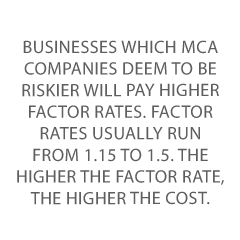If you have bad credit, but need small business financing, options for working capital can be limited. A merchant cash advance may be your best choice.
Essentially, you get an up-front sum that your repayment is with a percentage of any debit and credit card sale, plus a fee.
What is a Merchant Cash Advance?
A business with provable, reliable cash flow coming in from debit or credit card sales can leverage that anticipated incoming cash to get a merchant cash advance loan.
A small business owner works with a merchant cash advance company to set everything up. The MCA company will check credit card receipts to determine how much to advance.
The fee paid for this form of business financing is called a factor rate. The factor rate depends on a business’s industry, time in business, personal and business financials, and more.
Since the amount of the advance—and whether a company will advance money at all—is determined by a company’s debit and credit card sales, the entrepreneur’s personal credit score is not a determining factor.
As a result, an entrepreneur with a low personal credit score can get an MCA. But the entrepreneur’s FICO score will figure into how the MCA provider calculates the factor rate, which is the fee for this service.
Other data points which affect the factor rate include time in business, company industry, the business’s financial records, and debit and credit card transactions. Factor rates tend to run 1.15 to 1.5.
A higher factor rate means a higher fee.
How Merchant Cash Advances Work
A merchant cash advance company will check a business’s debit and credit card records to determine how big the advance should be.
Repayment terms can be structured as a percentage of debit and credit card sales. The MCA provider will deduct a daily or weekly sum until the advance has been repaid in full. Since sales fluctuate, so will the amount repaid in a given week or day.
Another way repayments for a merchant cash advance work is to allow the MCA company to take direct withdrawals from the company bank account. Since these are fixed payments, it allows a business to calculate just how much time it will take to pay back the MCA.
A business which does not depend so much upon debit and credit card sales will probably do better with direct withdrawals from their bank account.
Fees are based on a factor rate. A small business’s factor rate is calculated from its credit and debit card sales, but an MCA company will also take into consideration a few basic pieces of information.
An MCA company will take into account a business’s industry, its number of years in business, the personal credit score of its owner, and the small business financials.
Merchant Cash Advance Costs
The biggest cost is the factor rate. Businesses which MCA companies deem to be riskier will pay higher factor rates. Factor rates usually run from 1.15 to 1.5. The higher the factor rate, the higher the cost.
A business will pay back a percentage of its debit and credit card sales, or it will have a fixed amount regularly deducted from its bank account. Either way, a business will pay a substantial sum of money for getting merchant cash advances.
Paradoxically, the faster a business pays off an MCA, the higher its APR is. But the total paid is similar to what a business paying its debt more slowly would pay. But that slower business will have the MCA hanging over it for years.
Often, the amount paid back is very high—as in 50% or more of the initial debt. While a small business owner with bad credit may not have many choices for financing, these figures should remind anyone to review the terms carefully.
Since merchant cash advances are not considered to be loans, they do not fall under state usury laws. Hence, there truly is no legal limit to how much you can be charged.
MCA Advantages
There are good reasons why an MCA can be a smart choice for a small business.
You Can Get One with Bad Personal Credit
Bad personal credit is not a problem! For an entrepreneur with a substandard FICO score, an MCA could be their best bet. So long as a business can prove its debit and credit card sales adequately to a merchant cash advance company, they can get an MCA.
Small business owners completely shut out of all other types of financing could still get a business cash advance from a lender.
They Can Make it Possible for Disadvantaged Groups to Own Businesses
A recent Shift Processing survey of credit scores found:
- The average credit score for the Hispanic population was 701; average for the Black population was 677.
- People in their 20s averaged 662 (fair credit); people 50 and older averaged over 700.
- 4 states had average credit scores over 700: Minnesota, New Hampshire, South Dakota, and Vermont. The 4 states with the lowest average scores: Mississippi (647), Louisiana (650), Alabama (654), and Georgia (654).
Merchant cash advances can serve all these populations.
A Default Will Not be Reported to the Business Credit Bureaus
Since you are not building business credit, a default on a merchant cash advance loan will not harm your business credit score. However, it may show up on your personal credit report.
For business owners looking to build up their personal credit and repair it, a default will stymie their efforts.
And, since personal credit can affect personal credit—and it can affect a business owner’s ability to get a business loan—a default could harm business credit anyway.
There are no Limits on What You Can Use the Funding For
Banks and the Small Business Administration will both limit what an entrepreneur can do with any lent monies. But a business cash advance does nothing of the sort.
As a result, a business cash advance can be a great short term loan. With no constraints on usage, it could help a business cover payroll until a contract comes in. And it can help a small business weather inflation without raising prices.
MCA Disadvantages
There can be several reasons why you wouldn’t want an MCA for your business.
Fees, Fees, and More Fees
As you might imagine, a fast business loan to a person with bad credit is going to be costly. How costly? In a way, merchant cash advances are a lot like a business version of a payday loan.
Fees are high, and interest rates have no ceiling. Since factor rates differ from interest rates, an entrepreneur may not realize what they are getting themselves into until they have already signed the paperwork.
It Can Take Forever to Pay One Back
Interest never stops accruing.
Since repayment can be through credit and debit card sales, payments will change with future credit card sales. Even if your business merchant account is empty, you still have to pay something.
Often, merchant cash advance payments come with a minimum you must pay.
As a result, you can have a bad year in business and lose working capital, and then have to pay an MCA with your own personal funds.
You Cannot Build Business Credit With One
Because it isn’t a traditional loan, it will not be reported to a business credit bureau. A stellar payment history on merchant cash advances will not change your credit scores with Dun & Bradstreet, Experian, or Equifax.
Hence, unlike with a small business loan, you could be borrowing money but a future potential lender will not use your merchant cash advance payment history when determining if they will loan your small business money.
Shorter Terms Mean They Aren’t Good for Major Initiatives
An MCA is a poor way to buy major equipment or land. In general, it’s best for tiding the business over until profits come in, or covering the slow times for a seasonal business.
You could end up taking out the MCA, waiting for credit card payment from clients, and then plowing those profits right back into paying the MCA. And then never accumulating enough to change your business and break the cycle of debt-payment-debt.
Best Merchant Cash Advance Companies
Credibly
Credibly offers advances up to $400,000. Factor rates are as low as 1.9. Remittances are tied to receivables. You will need to have:
- A 500 credit score or better
- 6 or more months in business
- $15,000 or more in average monthly bank deposits
Get approved as quickly as the same day you apply. And you can get financing in 48 hours. You pay back a Credibly MCA with a daily remittance, taken from your business’s credit card sales.
Documents they want to see include:
- Cash flow information like past credit card and bank statements
- A copy of your business lease
- References
- Business tax returns
Libertas Funding
You can get up to $3,000,000 in alternative funding via Libertas Funding. Libertas offers payment terms between three months and a year. Both daily and weekly payment options are available.
You can get a prepayment discount of 10 – 25%.
Requirements for financing from Libertas:
- 12 or more months in business
- $50,000 in monthly revenue or better
- A 600 personal credit score or better
- Business must be in an industry Libertas will work with
You can get funds in 24 – 48 hours. Rates are based on industry, time in business, personal credit, business credit, and cash flow.
Reliant Funding
Note: their website is difficult to navigate, you will need to talk to a representative to get specifics on amounts available.
Pay back on a daily or a weekly basis.
Requirements:
- 6 months or more in business
- $60,000 or more in annual revenue
- A Credit Score (FICO) of 525 or more
They are less likely to approve if a business has been open for less than seven months or it has an open bankruptcy. Reliant will perform a soft credit pull.
If you are in good standing with Reliant and have paid at least 50% of your balance, you can get more financing from them.
Rapid Finance
A small business can get up to $500,000 from Rapid Finance. The estimated time to pay merchant cash advances back is three to 18 months. Payment frequency is variable, based on your business receivables.
A business can get additional merchant cash advances if necessary.
Rapid Finance has a partnering program. As a result, a small business could be working with any number of merchant cash advance providers—or a lender could be using Rapid Finance’s product under a white label.
This was another website where it was somewhat difficult to find specific information. You will likely need to speak with an account representative.
Thor Capital Group
At Thor Capital Group, a small business can get a merchant cash advance for up to $1,000,000. Get funding in 24 – 48 hours.
Businesses which have averaged over $10,000 in sales each month for the past three months will be able to qualify for 70 – 110% in funding in the form of a merchant cash advance.
For qualifying, in general, they will look for consistent revenue with minimum monthly receipts of $7,500 or more, and six or months in business.
They are willing to work with high risk industries, such as construction and convenience stores.
Alternatives to Merchant Cash Advances
For small business owners who want to avoid the long payment terms and high factoring rates of merchant cash advances, there are a number of viable business funding choices.
Businesses with proven expected revenue may do better with invoice factoring. Since it is based on incoming as-yet unpaid invoices, you get a large percentage of the invoice early—and the factoring company takes their cut right off the top.
Contrast this with MCAs, where payback depends on future sales.
Businesses with poor personal credit can also work with a guarantor or a credit partner. The guarantor’s better personal credit scores can open up financing options like a bank loan or SBA loans.
A business line of credit can be another business funding choice.
Equity financing can also work, so a business owner might want to look into attracting and working with angel investors. If the business is truly cutting edge, they may even see if they can attract venture capital investors.
If a business can get by with less working capital, they can consider microloans.
If the business owner is a good writer, they may want to try for grant money. Entrepreneurs in protected classes (women, disabled, immigrants, people of color, LGBTQ+, etc.) may have an advantage.
If the business owner can tell a compelling story online, they might also try crowdfunding.
Finally, business credit is a terrific choice for business financing. It can help any business and is an asset which can help now and in the future.

